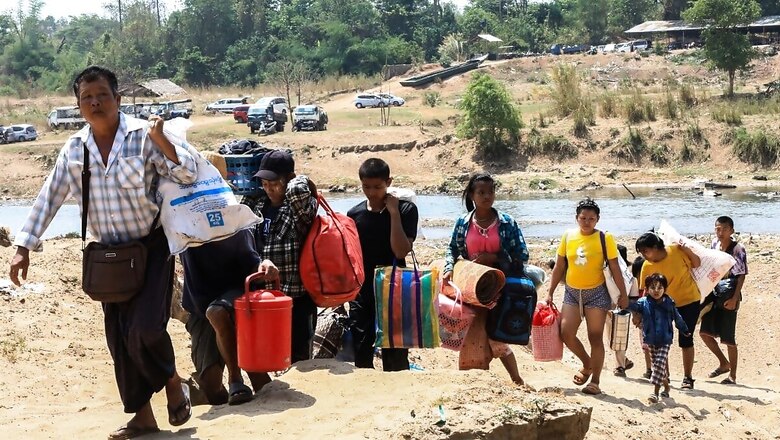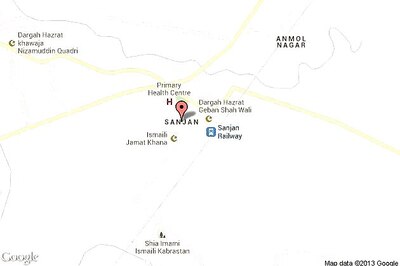
views
Myanmar is India’s gateway to Southeast Asia. Much of India’s ‘Act East Policy’ hinges on the continuing stability and security of Myanmar. The larger goal of the Indian government over the past decade has been to economically integrate the Northeast with countries in Southeast Asia. Needless to say, such integration poses a challenge to external players keen on containing India’s rise.
It has now become clear that there is trouble brewing in India’s east. If a full-blown civil war in Myanmar was not enough, we now have a new regime in Bangladesh, which is not as sympathetic to Indian concerns and interests as Sheikh Hasina was. Both Bangladesh and Myanmar are in flux, and if India has to protect its long-term strategic interests in the region, there is an urgent need for strategic recalibrations. For starters, India must rethink how it handles the fluid situation in Myanmar, and who all it engages with to do so.
The drama in Bangladesh has proven beyond a measure of doubt that placing all our eggs in one basket, and betting on one leader alone may not be the right approach. This should form the foundation on which India builds its new strategy of dealing with Myanmar, simply because a renewed strategy is the need of the hour. Myanmar is more or less split right in the middle between a military junta and several ethnic armed organisations (EAOs) resisting its rule. In latest news, the Arakan Army has seized most of central and northern Rakhine State, which borders India’s Mizoram and Bangladesh.
The Arakan Army is one of the most powerful armed organisations fighting the military junta in Myanmar. It is part of the ‘Three Brotherhood Alliance’ that has, since late last year, posted spectacular victories against the junta under an operation codenamed “1027". However, the Arakan Army is not just fighting to dislodge the military junta. It is, in fact, fighting a war of independence for the Rakhine state.
It is noteworthy that Myanmar’s ethnic armed organisations are claiming control over 60% of the country’s territory. While the scale of EAO control in Myanmar can be debated, what is clear as day is the fact that the military junta’s hold over the country is faltering. For India, which has chosen to side with the junta, this poses a strategic headache that must be remedied sooner rather than later. For starters, the Chinese offer a decent model to emulate.
China has consciously chosen to not place all its bets with one party in Myanmar. It has ties to both the military junta, as well as the ethnic armed groups. The ability to engage with the armed groups and rebels of Myanmar has allowed China to secure its border regions and strategic projects, although isolated incidents of violence are not unheard of. That being said, instead of depending solely on the ability of the Burmese military to protect Chinese interests and assets in the country, Beijing also works with various rebel groups to ensure the same. Many of these armed outfits are also recipients of handsome Chinese patronage and weapons, which should be a cause for concern for India.
Given the dynamics playing out in Myanmar, armed groups fighting the military junta are certainly not fringe elements that India can afford to ignore, or worse, have an acrimonious relationship with. In the event the military junta is toppled by the people and these EAOs, India will have no option but to watch as the Chinese post yet another strategic victory in the region. To avoid that scenario, there is an urgent need for India to engage just as much with the armed groups, even while its relationship with the junta continues on the trajectory it is on.
ENGAGE ALL STAKEHOLDERS TO AVOID GETTING CAUGHT OFF GUARD
If India continues to engage with Myanmar’s military junta alone, China will emerge as the most important foreign player in the civil war-torn country. Especially worrying for India should be the unilateral influence which China has over several ethnic armed organisations of Myanmar. If and when they are able to replace the military junta, Beijing could easily use these outfits to cause a serious security headache for India in the Northeast.
There is widespread resentment against the military junta’s rule among the people of Myanmar. On its part, India could argue that engaging openly with ethnic armed organisations would lend legitimacy to such outfits. However, such reasoning would be devoid of realpolitik – something which India is in dire need of as it navigates ties with Myanmar. After all, it is not like the military junta has set the standards of governance very high so far. It continues to bomb its own territories and people therein, leading to mass displacement and gross human rights abuses.
Add to that, the junta has issued a diktat for all young people to join the military’s ranks in what is seen as a mass conscription drive and a last-ditch effort to cobble up forces before a big showdown with the rebels. The point being, the military junta is surviving on borrowed time. Eventually, they will be pushed out of power. India would be well-advised to prepare for that eventuality.
What should also raise eyebrows in New Delhi is the state of Hindus in Myanmar. Recently, two Hindu outfits wrote to President Droupadi Murmu and Prime Minister Modi, asking for the Government of India to intervene urgently to ease the increasing difficulties faces by Hindus in Myanmar. Hindus have alleged that they are being treated like aliens and second-class citizens in the country. Many have even expressed their desire to flee to India until normalcy returns to Myanmar, for which they are requesting New Delhi to ease its Overseas Citizen of India (OCI) rules. In April this year, over 5,000 houses belonging to Hindus and Buddhists were gutted in Buthidaung, which is just 25 kilometres away from the Bangladesh border.
There is no lesser evil in Myanmar as things stand today, which is why India should not shy away from engaging with all relevant parties to ensure its own interests are protected. After all, there are two high-priority projects of strategic importance underway in Myanmar. The first is India-Myanmar-Thailand Trilateral Highway project, connecting Manipur in the northeast with Mae Sot in Thailand via Mandalay and Bagan in Myanmar. Although 70% of the project is completed, work has now come to a standstill due to the chaos unfolding in the country.
The second project is the Kaladan Multi-Modal Transit Transport Project (KMTTP) which will connect the seaport of Kolkata with Sittwe port in Rakhine State. There on, the project will connect Sittwe with Paletwa in Chin State via the Kaladan river boat route, while Paletwa will be connected to via road. This is India’s most ambitious project in the region, intended to bypass the Chicken Neck corridor in Siliguri and provide New Delhi with an alternative route to maintain connectivity with the Northeast. With both Rakhine and Chin states largely under the control of the Arakan Army, the fate of the Kaladan Multi Modal Project hangs in the balance. That should be incentive enough for India to engage with the Arakan Army and other rebel outfits in Myanmar.
In its present form, India’s approach to Myanmar is fraught with risks that could undermine its strategic interests in the region. By broadening its alliances, particularly with powerful groups like the Arakan Army, India can safeguard its critical projects and maintain stability in the Northeast. Most importantly, it can prevent China from developing an all-consuming influence over Myanmar’s ethnic armed organisations. After all, nobody wants a situation where India is forced to fight on three fronts in the Northeast alone – against China, Bangladesh and Myanmar. Proactive steps must be taken to ensure such a scenario does not become even a remote possibility.
Views expressed in the above piece are personal and solely that of the author. They do not necessarily reflect News18’s views.




















Comments
0 comment